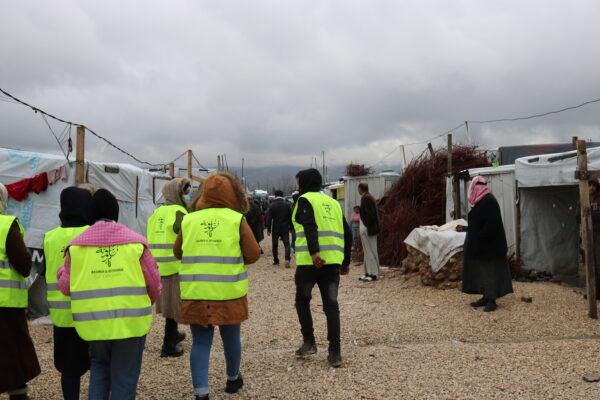Claude Samaha, Lead Researcher at Basmeh & Zeitooneh and a member of the Protracted Displacement Economies (PDE) team.
Resnik argues that ‘an objective researcher (or project, report, or study) is like a judge who attempts to give a fair hearing to both sides of a legal dispute’. This judge must attempt to make decisions based on legal and empirical evidence without allowing their values to affect their judgment and reasoning.
We also think of objective research as research that is unaffected by moral, economic, social, political or religious values. But in doing so are we not withdrawing from the human part of social research? Engaging in social fieldwork elicits strong emotions in researchers, and feelings can be powerful teachers. As an Arab researcher who shares the language, traditions, and customs of refugee groups in Lebanon, I am deeply affected by the dire situation in the country’s refugee camps. And I have discovered that emotions are necessary for building human understanding.
I remember the first time I was in an unofficial refugee camp. It was in the Beqaa area on a rainy day in February 2016. I was part of a group of students from the Lebanese University that was conducting multidisciplinary field research with pregnant refugee women and new mothers. Upon our arrival, we were welcomed by barefoot children in drenched tents. Newborns were placed on barrels covered with plastic wrap. Pregnant women and new mothers dragged their wet dresses trying to pull their children with one hand and holding their hijab with their other hand. Living in such conditions was clearly detrimental to the health and psychological wellbeing of the pregnant women, new mothers and their babies.

I went back to the same camp earlier this year, six years after my first visit as a student. Despite all the work non-governmental organizations and other civil society organizations have been doing, the situation has worsened. The camp lacks essential goods such as baby milk and diapers. There are no medical facilities. The ongoing economic crisis has affected displaced people as well as the ‘host’ community surrounding them. Many of the latter consider Syrian refugees to be one of the main causes of the crisis. The prevailing mood was tense rather than compassionate, which makes refugees’ lives much more difficult. I felt angry, frustrated and helpless.
Emotions in humanistic and social research are factual and concrete. Field researchers belong to communities. They share with those communities emotions like fear, sadness, joy, hope and depression. Instead of assuming that emotions impede our knowledge creation and dissemination, we should consider how emotions and their manipulation could be part of social norms, including norms of scholarly work.
In an attempt to better understand how economies function in communities that have faced different waves of displacement, Basmeh & Zeitooneh is conducting research in three of the poorest displacement-affected regions of Lebanon (Nabaa, El Qobbeh and Bar Elias). We estimate (based on data from United Nations agencies) that these regions have a combined population of around 130,000 residents. By studying non-monetary transactions as well as monetary transactions, we are taking a more comprehensive approach to economic analysis.
There are many reports about increasing poverty in Lebanon, and our findings offer further evidence of the dire situation faced by so many in the country. Of 4502 surveyed households, 340 (7.6%) indicate not everyone in the household has enough to eat. But in terms of humanitarian and social welfare, with an average of 5 people in every household, it means that many of those 1700 persons had to sleep hungry at least one night in the past month!
Furthermore, 2161 out of 4502 households surveyed have debts. In other words, almost half of those families depend on family, friends or small business owners for their daily living, and are in danger of hunger if personal loans or services on credit are suddenly stopped. The daily struggle that many in these communities endure is plain to see and should not be ignored.
This population is not just a number. This population has faces, and with every face comes a story. With those residents, we share history and stories, hopes and expectations, and sometimes we share a cup of coffee or tea. Does it make enumerators, supervisors, researchers and social workers less objective?
In field research, emotions could be a reason to escalate research engagement, explore techniques like contextual inquiry and grounded theory, and propose new intervention strategies. Being involved as a human helps in extracting and analysing useful insights while predicting behaviors based on field observation.
Showing empathy, sharing emotions and really listening to people enriches the data we collect through surveys and interviews. They make the numbers in Excel spreadsheets come to life and bring a depth to the stories that people share with us.
PDE is a project funded by UK Research and Innovation through the Global Challenges Research Fund (grant reference number ES/T004509/1). This blog appeared originally in the PDE website


Leave a Reply